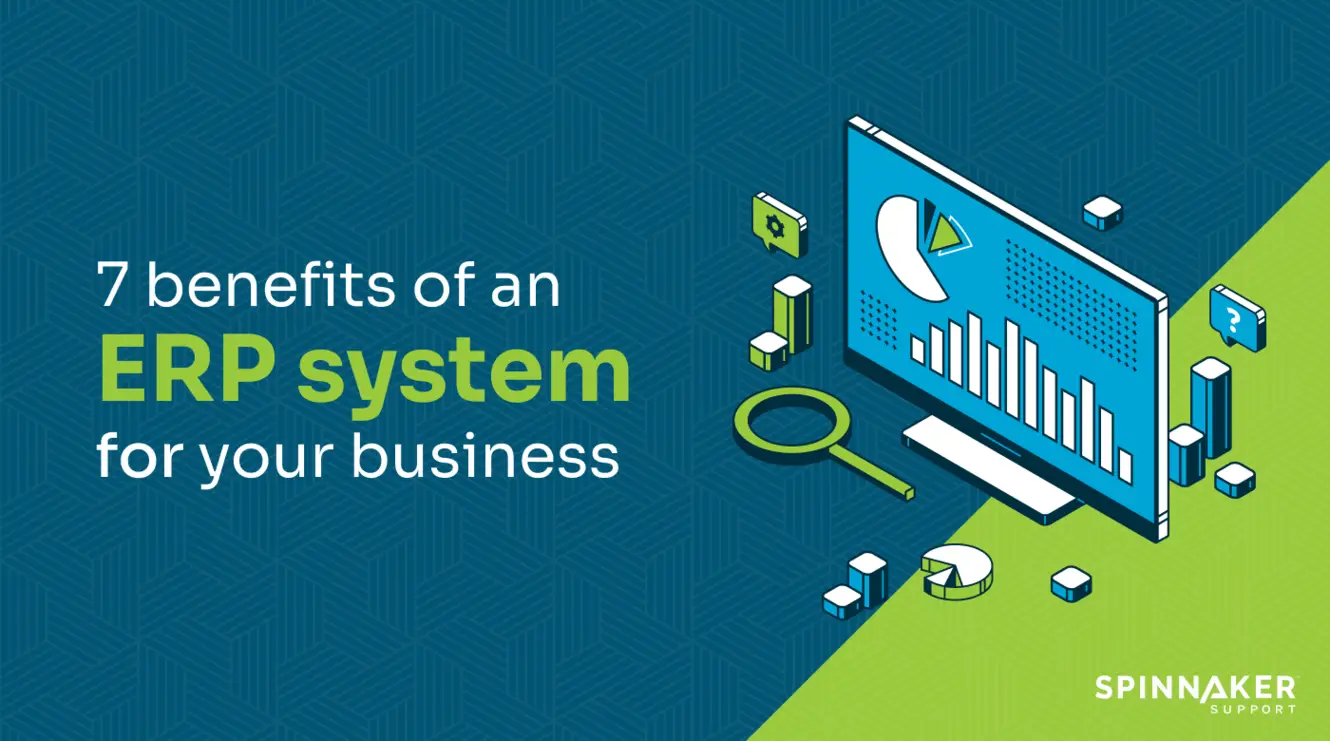
Your business may need to implement an ERP system if you’re:
- Experiencing rapid growth and want to support increased demand and complex operations
- Using multiple disparate systems and want to integrate all functions into a unified platform
- Lacking real-time visibility into key metrics and struggling with making informed decisions
- Looking to centralize customer data for effective customer relationships
Implementing an ERP system provides numerous advantages for modern businesses, from streamlined operations to improved data visibility, collaboration, and cost savings.
In this post, we’ll look at the top benefits of ERP systems and share how a third-party support provider can help you optimize your ERP investment.
What is an ERP system?
An Enterprise Resource Planning (ERP) system is a centralized platform that allows businesses to manage various processes, such as accounting, finance, human resources, sales, and inventory — cohesively and efficiently.
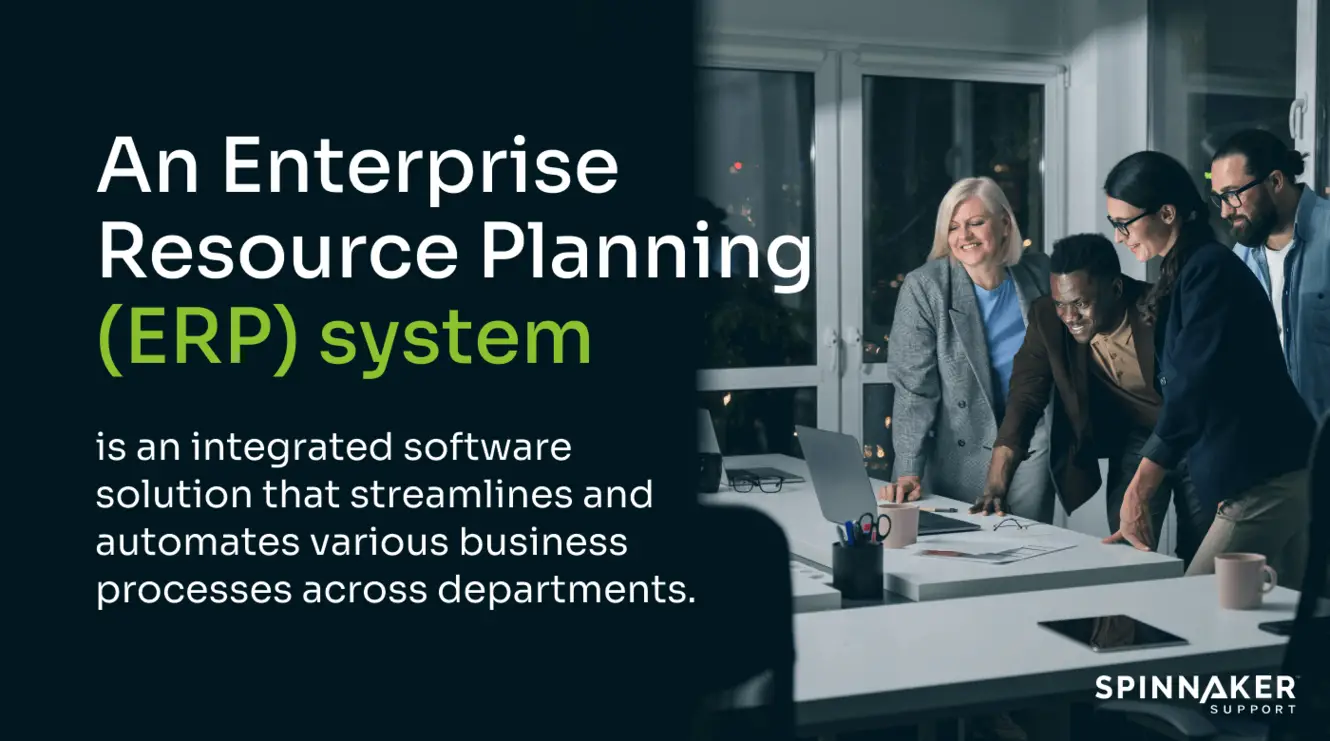
An ERP system provides a comprehensive view of the organization’s operations. There are many types of ERP systems, but there are two major ones:
- Cloud: Cloud-based ERP systems are hosted on remote servers and accessed online. They offer scalability, flexibility, and easy accessibility from anywhere, making them ideal for businesses with distributed teams or those looking for cost-effective solutions.
- On-prem: On-premise ERP systems are installed and hosted locally on a business’s servers. They offer greater control, data security, and customization options but require more upfront investment in hardware and infrastructure.
There are several well-known brands in the field of ERP systems. Some of the most common and reputable brands include:
- SAP: SAP is one of the leading ERP software providers globally and caters to businesses of all sizes and industries, offering a range of functionalities and modules.
- Oracle: Oracle is another prominent player in the ERP space. Their offerings are known for their robustness and scalability.
- Salesforce: Salesforce, primarily known for its CRM software, also offers ERP solutions that integrate with its customer relationship management platform.
- Microsoft Dynamics: Microsoft Dynamics offers an ERP solution suite that integrates seamlessly with other Microsoft products.
Next, we cover the benefits of an ERP system and how to select one for your business.
Benefits of implementing an ERP system
As businesses expand, they look for solutions that help them simplify their complex functions. That’s why the ERP software market has seen constant growth, as seen below.

ERP systems come with plenty of benefits. Let’s take a look at them.
1. Improved data visibility
An ERP system helps in data visibility by integrating all the departments and functions within an organization, allowing for real-time access to critical data. This enables employees to make informed decisions.
Let’s say a company uses an ERP system that connects its sales, inventory, and finance departments.
When a customer places an order, the sales department can immediately see if the product is in stock and provide an accurate delivery date. At the same time, the finance department can track the payment status, ensuring a smooth cash flow.
2. Enhanced collaboration
ERP systems facilitate collaboration among different teams and departments, promoting better communication and knowledge sharing. This improves communication, streamlines processes, and encourages cross-departmental cooperation.
For example, consider a manufacturing company that uses an ERP system. The production team can collaborate with the procurement team to ensure the availability of raw materials. They can also coordinate with the finance department to track costs and monitor inventory levels.
Such collaboration improves efficiency and allows for better decision-making and resource allocation.
3. Easy scalability
An ERP system can adapt to the growing needs of a business, ensuring it remains agile and competitive in the marketplace.
By integrating different functions into a single system, an ERP system enables organizations to quickly scale their operations by adding new users, locations, or business units, which supports business growth.
Additionally, an ERP system provides real-time insights and analytics, allowing organizations to adapt quickly to changing market conditions.
4. Streamlined operations
An ERP system centralizes all business processes, improving coordination and efficiency. Efficiency is the third most popular reason why companies want to implement ERP systems.

With an ERP system, employees can automate repetitive tasks and focus on more strategic activities, improving productivity and saving time.
For example, a manufacturing company can use an ERP system to automate and synchronize production planning, inventory management, and order processing to greatly reduce lead times and increase customer satisfaction.
5. Improved customer service
63% of customers are ready to pay more for a great customer experience.
As mentioned earlier, ERP systems help streamline business processes and provide real-time information. They enable businesses to have a centralized customer information database for better communication and personalized services.
An ERP system can expedite order processing, inventory management, and delivery through automation and integration, resulting in faster response times.
Additionally, it enables effective tracking of customer interactions and feedback, facilitating prompt issue resolution and enhancing satisfaction.
Moreover, the system’s analytics capabilities provide insights into customer behavior and preferences, enabling proactive decision-making to meet their needs swiftly.
6. Better reporting
ERP systems help improve reporting by providing a centralized platform for storing and accessing business data. They integrate data from different departments, allowing for real-time and accurate reporting.
With ERP, businesses can generate customizable reports that provide insights into various aspects of their operations, such as sales, finances, inventory, and production. These reports can help identify trends, make data-driven decisions, and monitor key performance indicators.
In addition, ERP systems often offer advanced analytics capabilities, enabling users to analyze data more effectively to gain in-depth insights into various business processes.
7. Strong data security
An ERP system provides a centralized database to store all sensitive information, reducing the risk of data breaches.
Most ERP systems implement strong authentication and authorization mechanisms, ensuring only authorized individuals can access the data.
These systems employ encryption techniques to protect data during transmission and storage. They implement regular backups and disaster recovery plans to prevent data loss.
Many ERP systems have certifications in security standards, such as SOC 2. These certifications validate that the ERP system meets specific security requirements and follows best practices in data protection.
How to select an ERP system
When choosing an ERP system, there are several factors to consider.
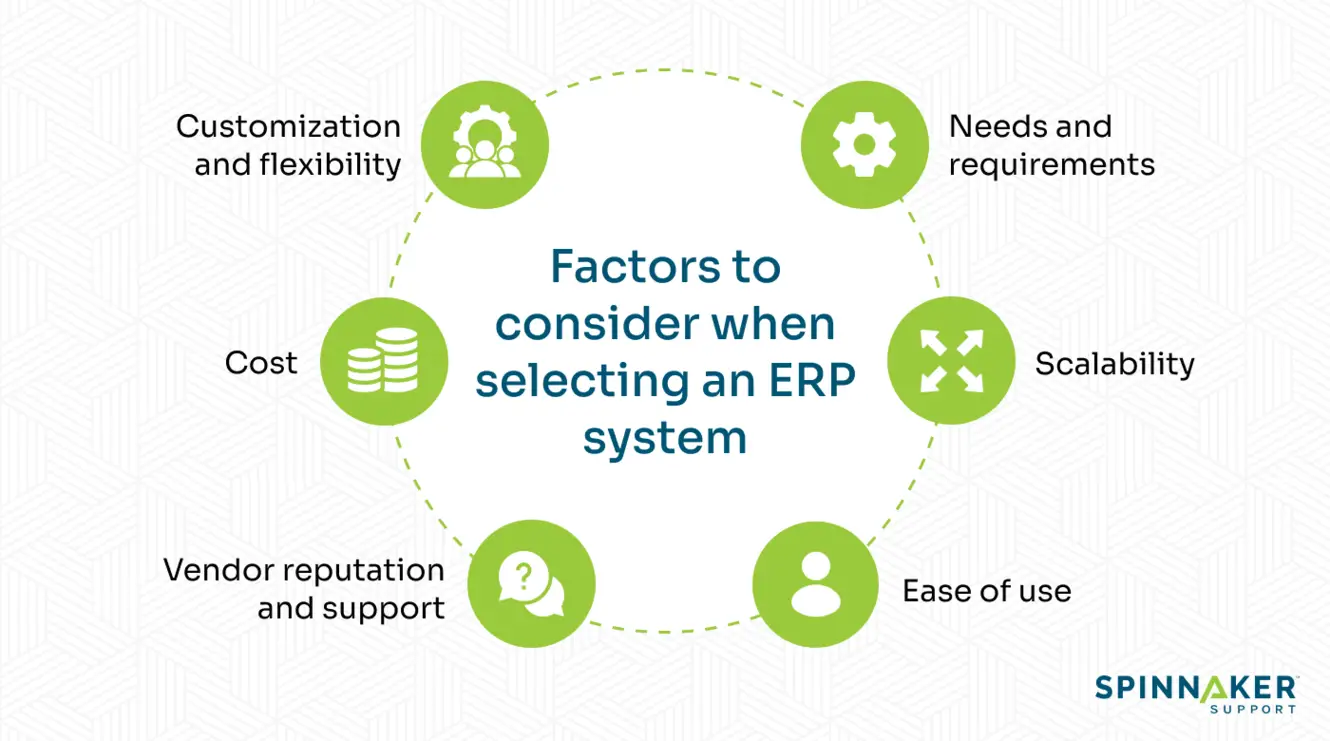
Let’s look at a few of them in the following sections.
Needs and requirements
To begin with, you must evaluate your organization’s specific requirements and needs. This involves identifying the key functionalities and features essential for your business operations.
For example, if your company deals with complex inventory management, prioritize an ERP system offering advanced inventory tracking and control capabilities.
Scalability
Your ERP system should accommodate the increasing volume of data and transactions as your business grows.
For instance, if your organization plans to expand internationally, consider an ERP system that can handle multiple currencies, languages, and tax regulations.
It should also support integration with your organization’s other systems, such as CRM software, manufacturing systems, or e-commerce platforms, to ensure smooth data flow across different departments.
Ease of use
The usability of an ERP system is an essential factor to consider. It should have an easy-to-navigate and intuitive interface. Consider providing training sessions and support mechanisms to help users adapt to the new system.
Vendor reputation and support
It’s crucial to research and consider the reputation and support of the ERP system vendor.
A reliable and experienced vendor will provide ongoing support, updates, and maintenance for the system so that you aren’t burdened with many things to do simultaneously.
Cost
Evaluate upfront costs of an ERP system, such as licensing fees and implementation costs, as well as ongoing costs like maintenance, support, and upgrades.
Also, consider the return on investment (ROI) and the potential cost savings and efficiency gains the system can provide.
Customization and flexibility
The system should also be flexible enough to adapt to business operations and requirements changes.
For example, if your business has specific processes or workflows different from industry standards, you would want an ERP system that allows customization.
ERP Implementation challenges you can face
Of course, implementing ERP systems offers many advantages. But there are several challenges you can face. Here are just a few of them.
Resistance to change
Employees may refrain from adopting new processes and systems, requiring proper change management and training.
Data migration
ERP migrations can be complex and time-consuming. For the process to happen error-free, you need careful planning.
Integration complexity
Integrating the ERP system with other systems you use, such as CRM or accounting software, may pose technical challenges.
Customization requirements
Meeting specific business needs may require customization, increasing complexity and cost.
Implementation time and costs
ERP implementations can take several months or even years, and costs can escalate if they’re not managed properly.
There are several factors at play here. Everyone in the organization may have different use cases for an ERP system, so there can be misaligned objectives.
Weak project management and insufficient focus on business value can also stretch the implementation time.
High support costs
The complexity of ERP systems often requires specialized technical expertise to maintain and troubleshoot.
This expertise comes at a premium cost, contributing to the high support and maintenance costs. Plus, support costs cover almost 90% of the total revenue of most ERP companies. For example, SAP support from the publisher is 17-22% of the license fees. They also keep increasing these fees every year.
However, working with a third-party support provider, like Spinnaker Support, can help you overcome these challenges.
Here’s how our services stack against other software publishers:
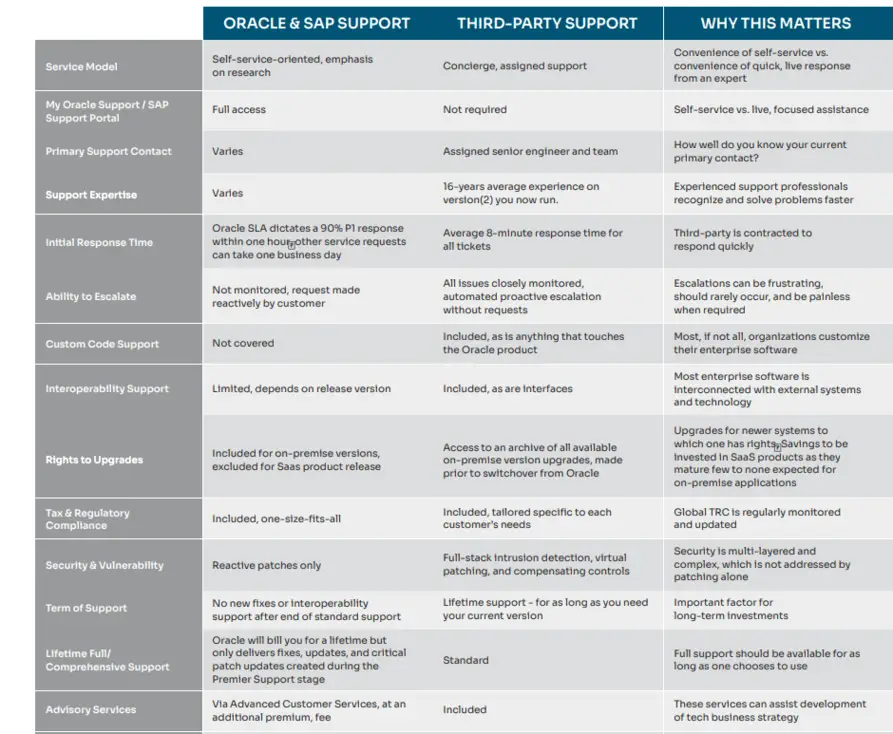
Let’s dive into more details in the following sections.
Third-party support for ongoing maintenance
Spinnaker Support’s third-party support (3PS) can lower your maintenance fees by almost 60%. For instance, our client, Weyerhaeuser, one of the world’s largest forest product companies, immediately saw a savings of 66% after switching to Spinnaker Support.
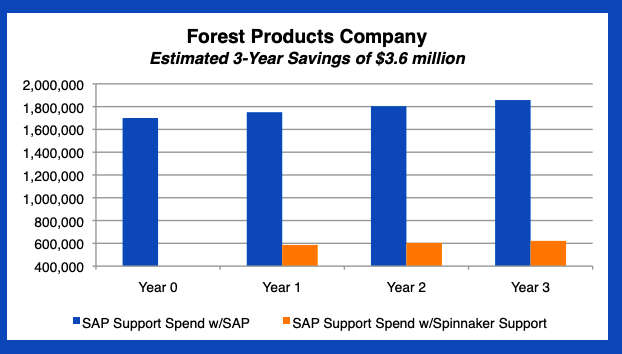
We provide 3PS for SAP, Oracle, JD Edwards, and Microsoft. Here’s more on how you can utilize our offerings.
Team members with 20+ years of experience
Our support specialists have over 20 years of experience. We assign a specialized team of account leads and curate experts from the domain of:
- Interoperability
- Cross-functional development
- Technology
- Security
- Application development
- System administration
This team becomes a part of your IT team so that all future troubleshooting becomes more straightforward and faster.
Robust security standards
Software vendors rely only on software patches for security. However, in our experience, that’s not enough.
At Spinnaker Support, we protect and harden your systems with in-depth defense. Our Spinnaker Shield solution helps protect your ERP system against any vulnerabilities and threats.
We also offer regular tax, legal, and regulatory compliance support customized to your industry and geography.
Prompt troubleshooting
Most publishers don’t provide you with quick resolutions. Their first line of support is often to direct you to a knowledge base link so you can troubleshoot the problem independently.
Junior staff often handle your issue when you can’t find a solution and ask them for support.
However, with Spinnaker Support, you always get a response in 15 minutes or less. We bring you in touch with Level 2 and Level 3 engineers and Level 4 in advanced cases to resolve your issues.
Here’s more on how we approach our client’s tickets:
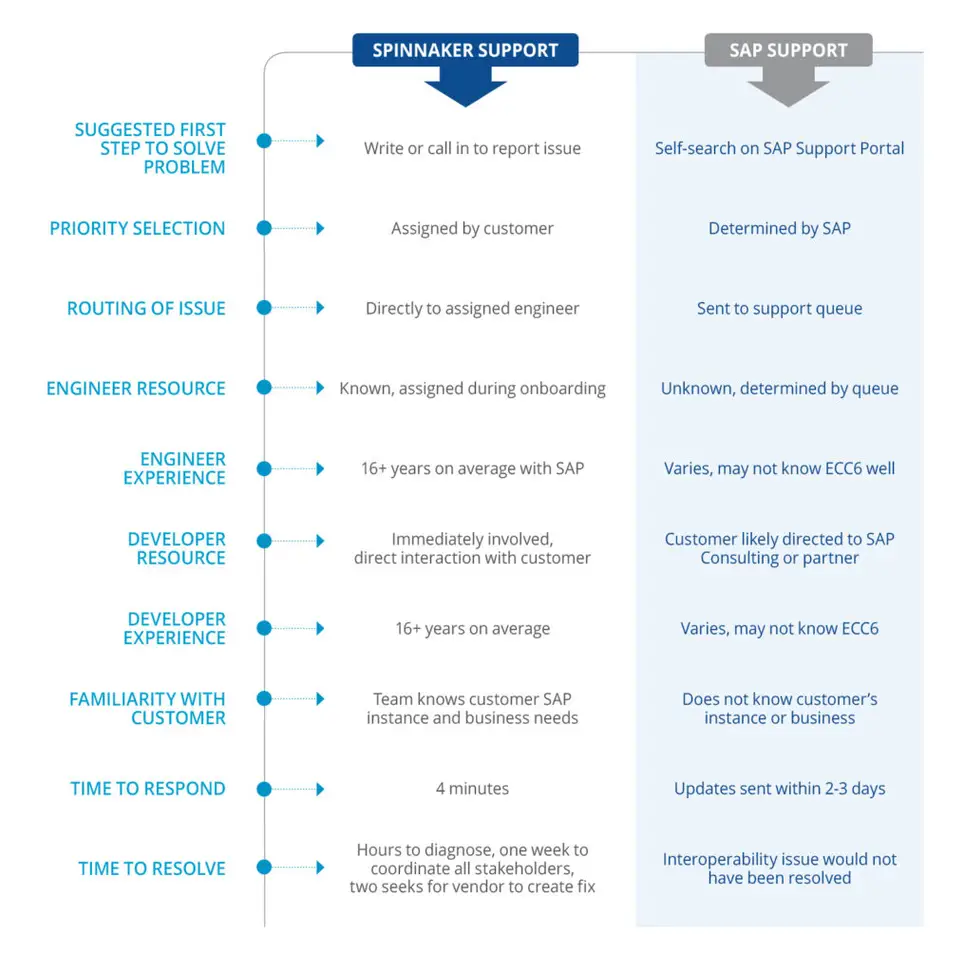
For example, BancTec shares how they couldn’t connect to a real person on SAP support and had to find a resolution themselves.
With Spinnaker Support, they can either call, email, or screen share a support specialist, and they always receive a quick solution.
Support for interoperability issues
Most software publishers don’t provide custom code and interoperability issues. At Spinnaker Support, we provide both.
For example, with Spinnaker Link, we can have an older technology function with newer browsers. Or we can enable new operating systems with your applications.
Optimize your ERP systems with Spinnaker Support
Now that you know how beneficial implementing an ERP system can be, overcome your support challenges by partnering with Spinnaker Support.
Since we started in 2008, we’ve worked with over 1,400 clients and received a 96.3% customer satisfaction rating in 2022 due to our personalized services.
Contact us now and enjoy the benefits of ERP systems.


